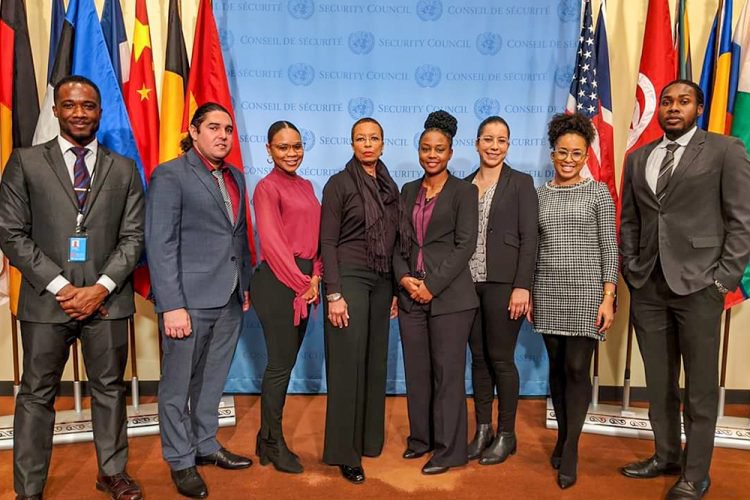The Journey to the United Nations Security Council
Before July 2019, three countries of Caribbean Community (CARICOM) had been elected to serve as non-permanent members on the 75-year-old United Nations Security Council (UNSC). Guyana had done so on 2 occasions, 1975-67 and 1992-93; Jamaica, 1979-80 and 2000-01, and Trinidad and Tobago 1985-86, meaning that the last time a CARICOM member-state served on the UNSC was 2001. Based on land mass, Trinidad and Tobago was, before 2020, the smallest country in the region and possibly among the membership of the United Nations to serve on this very powerful international body.
That regional representation at the CARICOM level had served a total of 5 times in 74 years, an average of once every 15 years, when examples exist of a single country serving as many times within the last 30 years, suggest a system that favours the large and the powerful. There continues to be discussions around the eventual reform of the United Nations Security Council, with little indication of a consensus being arrived at any time soon, yet member states of the United Nations, including those in a grouping known as the L69, continue their attempts to keep the discussions alive.
Saint Vincent and the Grenadines through its Permanent Representative H.E. Rhonda King, currently serves as the spokesperson for the L69.
Our turn, our voice
In 2009, Saint Vincent and the Grenadines declared its intention to seek election as the Group of Latin America and the Caribbean (GRULAC) candidate for the 2010-11 non-permanent seat on the UNSC. The then Permanent Representative to the United Nations, H.E. Camillo Gonsalves, had been involved over his tenure in activities at the highest level in the organization, including Co-chairing a global conference on the impacts of the 2008 financial crises that had exposed this country as a thought leader among Small Island Developing States (SIDS). It was evident that this country was experiencing improved reputation at the international level stemming from excellent representation, a result of a clear and principled foreign policy, and good governance practices at home through the deepening of our representative democracy, openness and transparency. In the face of clear and undeniable evidence of the leadership provided by SVG at the UN, our government was convinced that we possessed all of the elements necessary to serve the world at the level of the United Nations Security Council.
No sooner had we indicated our intentions to seek election to the UNSC, Colombia, another member of GRULAC, also indicated its intentions to seek election for the same vacant seat. This meant, that SVG’s bid was no longer uncontested, a much easier pathway to election; we now faced a contest with another member state of our region. The prospect of a battle, firstly for the nomination of GRULAC gave all indications that it would have been hotly contested, and would have presented a potential fallout that could have created unnecessary divisions. Therefore, in wisdom, PM Gonsalves withdrew SVG’s bid for election. What had begun in earnest however, was in fact a 10-year campaign that would be carried out in a strategic and very meticulous way, to ensure a successful outcome.
Friends of ALL
Over the next 10 years, SVG embarked on a multifaceted campaign for a non-permanent seat on the UNSC.
There were significant expansions in the number of countries with which we established diplomatic relations, with ideology (religious or political) serving no purpose, but purely on the basis of shared interests, mutual respect for international law, and adherence to the principles of the UN Charter. Existing relations were deepened as was obvious in the number or invitations offered to this country’s leaders to pay official visit to allies, as well as official visits made to this country by foreign leaders and officials. During the campaign period, Saint Vincent and the Grenadines continued increasing its visibility, reputation and influence within the United Nations, and our country’s diplomats assumed greater and greater roles of leadership. During the 72nd Session of the UN General Assembly, H.E I Rhonda King served with distinction as the chair of the sixth committee that deals with the entire organisation’s budgetary and financial matters. This, during a period that saw the USA under a new president, slashed contributions to the organisation, at a time when member states sought to maintain and, in some cases, increase its mandate. In 2017, Saint Vincent and the Grenadines was elected to serve as one of the Vice President, of the Economic and Social Council (ECOSOC), and in 2018 served as that Council’s President. Those two years in the leadership of ECOSOC presented many opportunities to SVG to show real leadership in areas of the Sustainable Development Goals (SDGs), climate change, renewable energy, the fight to eradicate poverty, food security and the provision of quality healthcare, in the process gaining international recognition. Saint Vincent and the Grenadines, virtually unknown hitherto, had risen in stature at the premier organisation in the world.
Conclusion
With 2 days to go before the elections at the UN General Assembly, El Salvador announced its bid for the GRULAC seat on the UNSC, making it a contested election. On this occasion, confident in the work we had done over the last 10 years, forging relationships, showing leadership and promoting our ideas on the issues confronting our world, our government never wavered. Dr Gonsalves and Sir Louis along with other diplomats, were present for the elections in the GA Hall, with the Prime Minister casting the ballot on behalf of SVG. In the end, when the votes were counted, Saint Vincent and the Grenadines received 185 of the 193 votes cast with El Salvador obtaining 6 votes and 2 abstention. It was indeed a joyous occasion for this country; the world applauded and watched in amazement at an accomplishme


